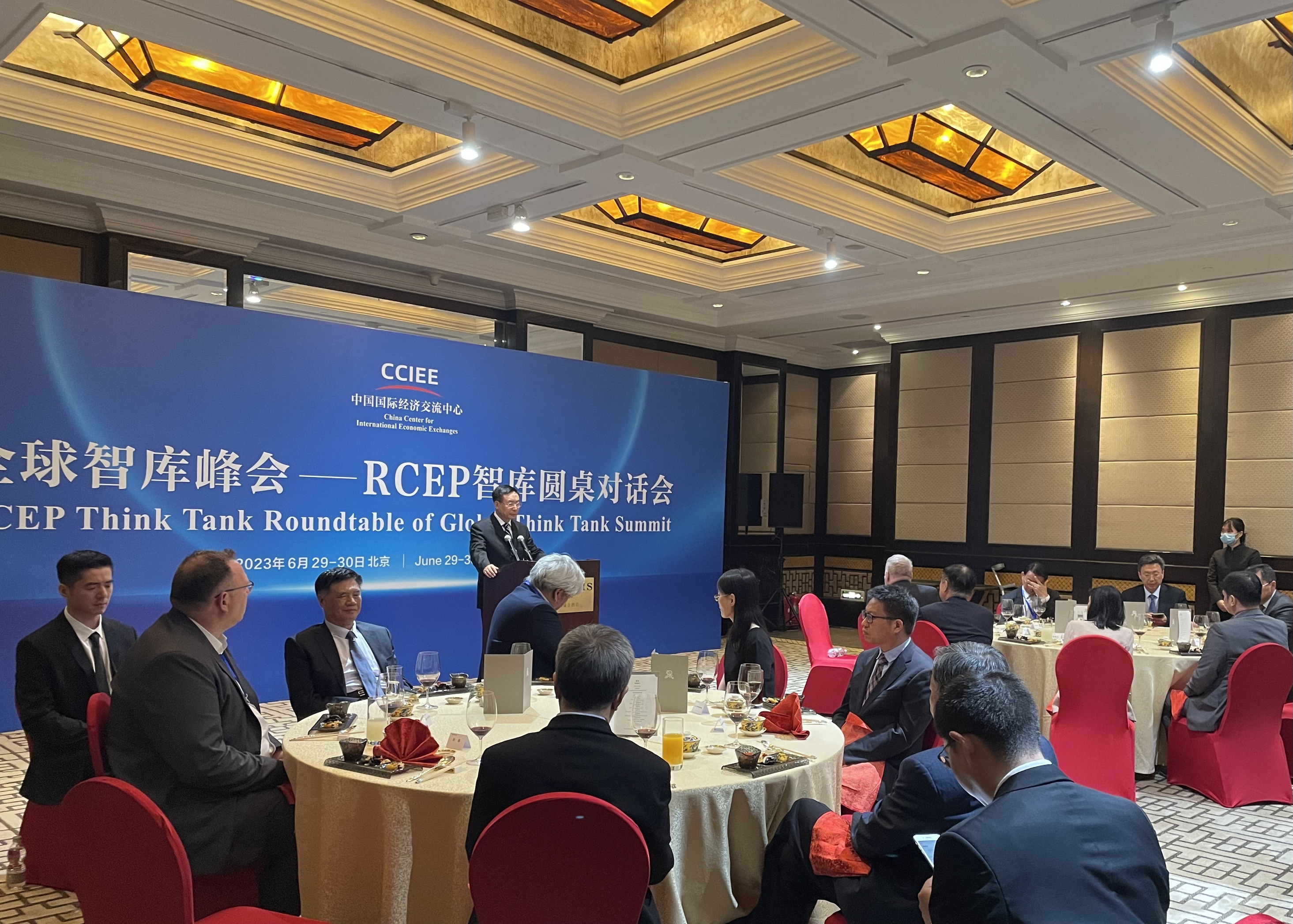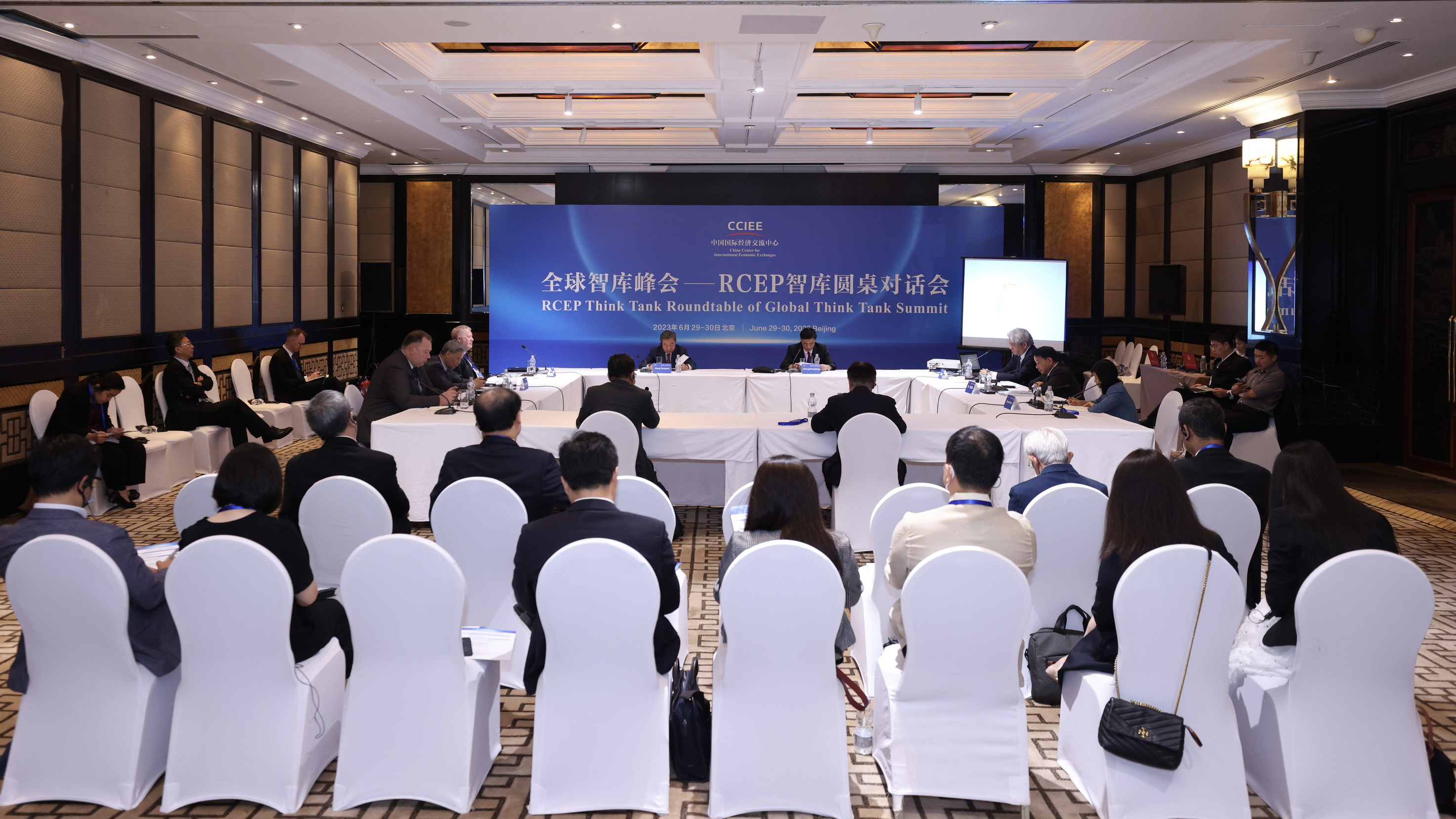CCIEE Held the RCEP Think Tank Roundtable of Global Think Tank Summit
- Time:2023-07-05
- source:CCIEE
From June 29-30, 2023,the China Center for International Economic Exchanges (CCIEE) successfully hosted the RCEP Think Tank Roundtable of Global Think Tank Summit in Beijing. The meeting was attended by nearly 40 participants, including diplomats from RCEP member countries such as Australia, Cambodia, China, Indonesia, Japan, South Korea, Laos, Singapore, Thailand, the Philippines, Vietnam, think tank leaders, experts, scholars, and government representatives. The dialogue focused on the two topics of "improving trade and investment liberalization and facilitation, achieving high-quality development of the RCEP regional economy, and helping to accelerate the recovery of the global economy" and "releasing the development dividends of RCEP: promoting industrial upgrading and optimizing the business environment". Bi Jingquan, executive vice chairman of CCIEE attended the welcome dinner and delivered a speech. Zhang Xiaoqiang, executive vice chairman and director of the board of executives of CCIEE, Ning Jizhe and Jiang Zengwei, vice chairman aof CCIEE, attended the welcome dinner and meeting.

Bi Jingquan pointed out that the full entry into force of RCEP reflects the strong desire of regional countries to strengthen economic integration and achieve common development, and marks that the free trade zone with the largest population, largest economic and trade scale, and the greatest development potential in the world has entered a new stage of full implementation. As a participant and promoter of RCEP, China will continue to strengthen policy alignment, deeply integrate into the regional market, continuously optimize the business environment, strengthen economic and trade cooperation with member states, and share opportunities in the Chinese market. China is willing to continue to work together with relevant parties to fulfill its obligations under the agreement, continuously strengthen the construction of the RCEP mechanism, provide a strong guarantee for the stability and long-term development of RCEP cooperation, achieve mutual benefit, win-win and common development at a higher level, and inject vitality into regional and global economic recovery.

Zhang Xiaoqiang stated that RCEP is a successful example of open regionalism and a vivid practice of regional countries sharing development opportunities. In the face of global economic risks and challenges and external environmental uncertainties, comprehensively promoting the implementation of RCEP requires member states to jointly promote high-level opening up of RCEP in the spirit of openness, inclusiveness, mutual benefit and win-win, based on regional development needs. China will actively explore the integration of RCEP and CPTPP, strengthen the integration of international high-standard trade rules, promote the construction of RCEP industrial alliance, further deepen cooperation in the fields of digital economy, green economy, marine economy, technological innovation and regional tourism, and promote Asia-Pacific economic integration.

Experts attending the meeting agreed that the current international situation is complex and protectionism and unilateralism are on the rise, posing practical challenges to regional economic integration and sustainable development. RCEP is conducive to promoting post-epidemic global economic recovery, stabilizing global industrial and supply chains, promoting the formation of a unified regional market, and reshaping the pattern of global trade and industrial division of labor. Its rules of origin and zero-tariff measures help promote trade and investment liberalization. It is necessary to strengthen publicity and guidance to help enterprises make better use of the RCEP system and rules. All parties should make full use of the opportunity of RCEP to fully enter into force, work together to enhance mutual trust, and support open multilateralism; at the same time, they must seize the opportunity and use a pragmatic attitude to promote the expansion and upgrading of RCEP, produce practical results, and enhance the inclusiveness and diversity of RCEP; promote the institutionalization, the establishment of the Secretariat and improve the governance mechanism of RCEP.

The attending experts agreedd that RCEP provides new channels for other member countries to engage in economic cooperation with China, which is beneficial for mitigating challenges related to geopolitical risks and enhancing mutual trust. In the future, there should be deeper practical cooperation in areas such as digital trade, services trade, technical assistance, and talent exchange. This includes accelerating the alignment of rules and standards, improving institutional reforms, promoting industrial upgrading, and optimizing the business environment. These efforts can unlock dividends in trade, industry, institutions, and development. China should accelerate the construction of a new development pattern, drive high-quality development, and open up at a high level to facilitate regional common development. To achieve this, think tanks from RCEP member countries should continue to strengthen exchanges and dialogue, actively provide policy recommendations, and promote the high-quality implementation of RCEP.
